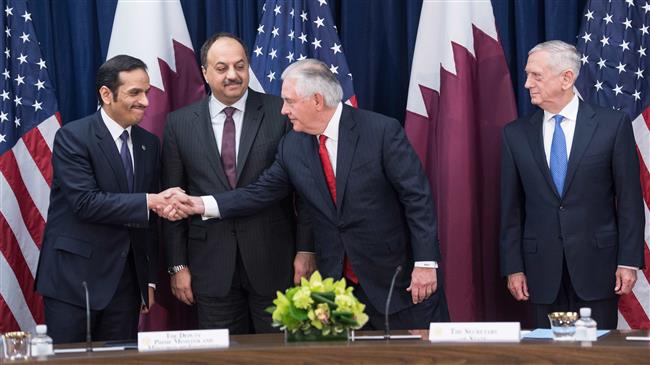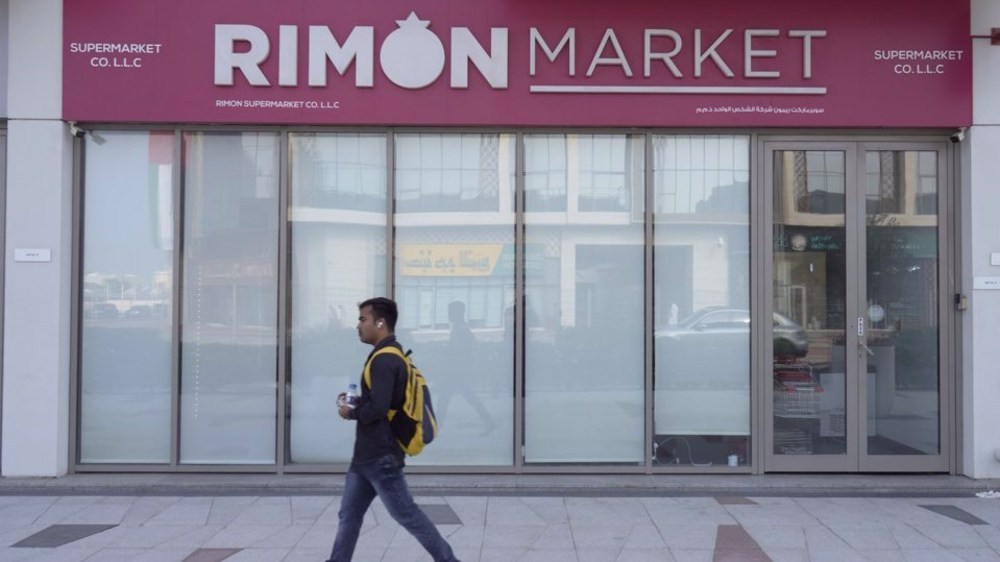Leaked emails: UAE lobbied US to sack Tillerson for backing Qatar
Leaked emails reveal the United Arab of Emirates (UAE) lobbied the US last year to sack Secretary of State Rex Tillerson for failing to side with Abu Dhabi against regional rival Qatar amid a diplomatic rift between the two Persian Gulf countries.
The emails obtained by the BBC Monday showed that UAE-linked businessman Elliott Broidy, who was a fundraiser for US President Donald Trump, met him in October 2017 and urged him to fire Tillerson.
According to the BBC article, the emails are an account of what Broidy told Trump during that meeting.
Broidy called the top US diplomat “a tower of Jello,” “weak” and said he “needs to be slammed.”
He said that Tillerson was “performing poorly and should be fired at a politically convenient time.”
According to a memorandum he prepared of the meeting, Broidy urged Trump to support the UAE and Saudi Arabia, advising the US president against getting involved in the row with Qatar.
Broidy also said Qatar was “a television station with a country,” referring to the Doha-based Al Jazeera broadcaster, which has routinely aired critical coverage of Saudi Arabia and the UAE, most recently of their military campaign against Yemen.
Broidy emailed a detailed account of his meeting with the president to George Nader, a Lebanese-American businessman with decades of experience serving as an interlocutor between the Middle East and Washington.
According to The New York Times, Broidy’s defense company Circinus has hundreds of millions of dollars worth of contracts with the UAE. He had recently returned from the UAE when he met Trump at the White House in October.
The paper reported on Sunday that both Broidy and Nader are people of interest in US special counsel Robert Mueller’s probe into whether Trump illegally collaborated with foreign countries during the presidential campaign.
“Mueller’s investigators have questioned Nader and have pressed witnesses for information about any possible attempts by the Emiratis to buy political influence by directing money to support Trump during the presidential campaign, according to people with knowledge of the discussions,” the paper reported.
The UAE, Bahrain and Egypt led by Saudi Arabia severed their diplomatic relations with Qatar on June 5, 2017, accusing Doha of sponsoring “terrorism” and destabilizing the region, an allegation strongly denied by Doha.
The Saudi-led quartet presented Qatar with a list of demands and gave it an ultimatum to comply with them or face consequences.
The demands included closing the Al Jazeera broadcaster, removing Turkish troops from Qatar’s soil, scaling back ties with Iran, and ending relations with Egypt’s Muslim Brotherhood movement.
Doha, however, refused to meet the demands and denounced them as unreasonable.
Tillerson has criticized the embargo, saying it was “impairing US and other international business activities in the region and has created a hardship on the people of Qatar and the people whose livelihoods depend on commerce with Qatar.”
During the Kuwait International Conference for Reconstruction of Iraq last month, Tillerson also called on Arab monarchies to resolve their diplomatic dispute with Qatar
Amid the diplomatic crisis, Abu Dhabi has taken an especially tough line towards Doha.
Last month, Qatar’s Defense Minister Khalid bin Mohammad al-Attiyah said Saudi Arabia and the United Arab Emirates had planned a military invasion of his country at the beginning of a diplomatic crisis that erupted last year.
A series of leaked documents revealed in November 2017 that the UAE had a stunning detailed plot to launch an economic war on Qatar.
Dubai security chief Dhahi Khalfan also called on the Saudi-led coalition attacking Yemen since 2015 to bomb the Qatari media network Al Jazeera.
VIDEO | Vietnam current prosperity
Report blames gasoil exports for shortage at Iranian power plants
VIDEO | Hind Rajab Foundation names Israeli war criminals vacationing after Gaza genocide
VIDEO | Australians rally for Gaza ahead of Christmas festivities
VIDEO | Attacks on Sana'a
Iran reports further drop in annual inflation rate in December
Israel indicts two settlers over suspected spying for Hezbollah
Iran: US airstrikes on Yemen war crimes, violation of international law












 This makes it easy to access the Press TV website
This makes it easy to access the Press TV website